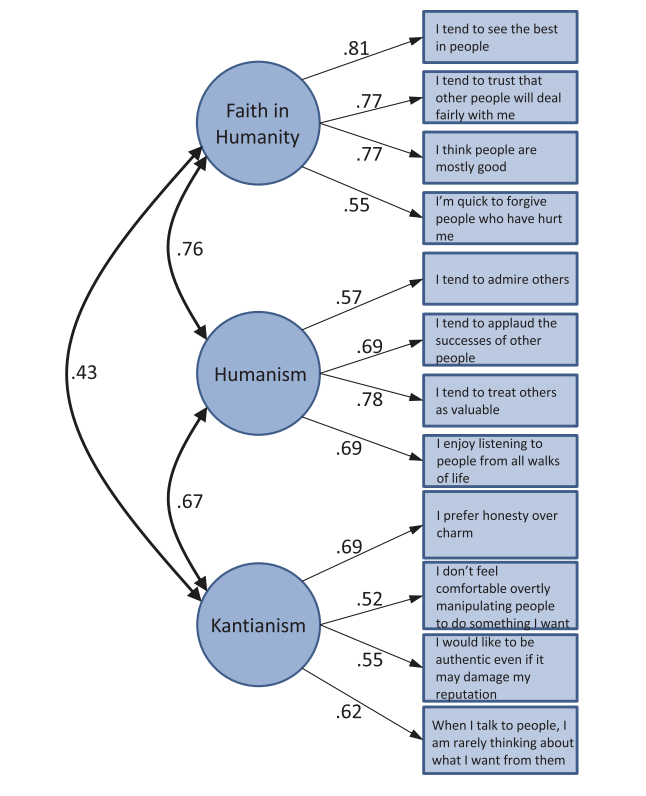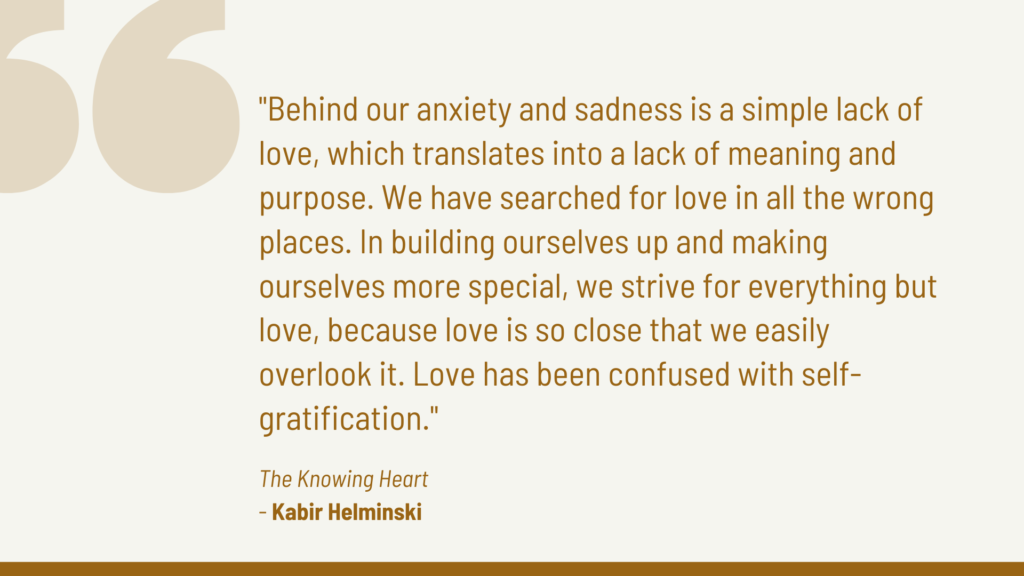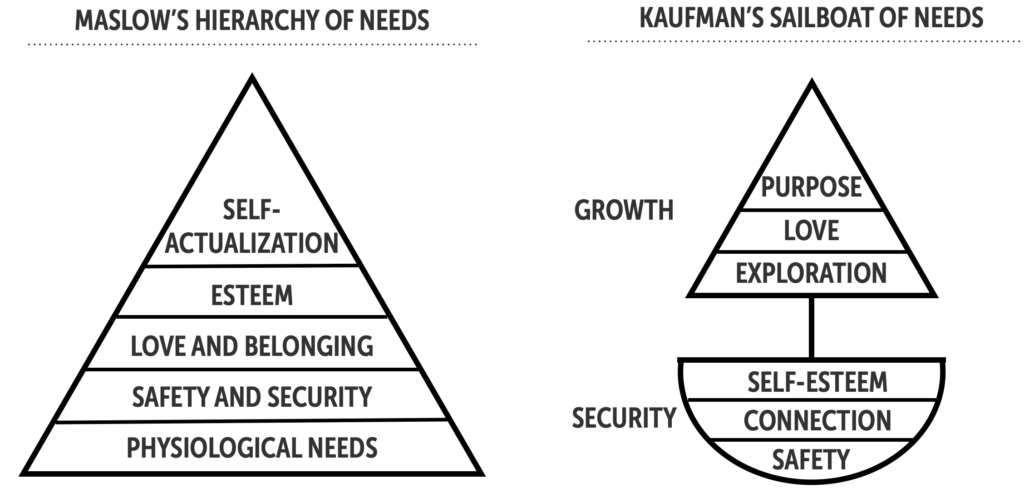The Role of B-Love in Self-Transcendence: Dark Versus Light Triad and Moral Mastery
Key concepts summarized
- We all possess certain levels of dark versus light triad characteristics, but the LTS is correlated with more positive outcomes in various domains of well-being.
- People who are B-loving, or higher on the LTS, are more likely to achieve self-transcendence.
- To avoid causing harm to ourselves or others and truly connect with our purpose, we must first tap into our true essence of love.
Self-Transcendence
Self-transcendence is, at its core, about transcending (or rising above) the self and relating to that which is greater than the self. Abraham Maslow’s concept of “transcenders” describes individuals who surpass traditional self-actualization to achieve a state of self-transcendence, where they experience frequent insights that extend beyond the self, fostering a better society through the integration of their whole self. Unlike merely self-actualized individuals, transcenders utilize all aspects of themselves for the collective good, driven by a deep ethical commitment to humanity. This concept, discussed in his 1969 “Theory Z” paper, highlights the significance of striving for higher values and contributing positively to the world, aligning with the principles of transpersonal psychology that recognize the existence of dimensions beyond the sensory perception (Maslow, 1969).
Light Versus Dark Triad
Our true self in a broad sense, is our whole being integrated, encompassing both our dark and light triad traits (Kaufman, 2019; Paulhus, 2002). The dark triad of our personality is comprised of “grandiose narcissism (entitled self-importance), Machiavellianism (strategic exploitation and deceit), and psychopathy (callousness, cynicism, and impulsivity)” (Kaufman, 2020 p. 121). On the other hand, the Light Triad consists of Kantianism (Treating people as ends unto themselves, not as mere means.), Humanism (Valuing the dignity and worth of each individual), and Faith in Humanity (Believing in the fundamental goodness of humans) (see figure 1).

Kaufman and others conducted a fascinating study in which they explored the connections between the Light Triad Scale (LTS) and various aspects of psychological well-being and personality traits. The Light Triad Scale was found to be positively correlated with life satisfaction, self-transcendence, agape (selfless love), and many other positive attributes. These findings suggest that the Light Triad may play a significant role in living a fulfilling life and achieving genuine transcendence (Kaufman et al., 2019). To explore additional attributes associated with the Light Triad and their levels of correlation, please refer to the paper here.
Our True Essence: Selfless Love (agape)
The most authentic part of us is our desire to understand love, embody love, and teach love. This understanding is shared by many great thinkers, including Mary Cosimano from John Hopkins University who wrote a paper titled ‘Love: The Nature of Our True Self’ in which she identifies that love is connection (Cosimano, 2014). Dr. Brene Brown shares the same understanding, who says “love is the greatest thing we do. It is the reason we’re here. We’re here to love”. Love is the invisible force that connects us to all of life, and it is the lack of love that creates feelings of loneliness.

D-Love versus B-Love
The concept of altruistic love has strong roots in psychology, particularly in humanistic psychology. Abraham Maslow, in humanistic psychology, distinguished between Being-Love (B-love), love for the being of another person and Deficiency-Love (D-love) (Maslow, 1968). People who are B-loving score higher on the LTS and are more likely to be self-transcended. The idea of B-love is beautifully explained by Erich Fromm in his book ‘The Art of Loving’ saying that ‘In order to increase the love we receive, we have to increase our capacity to give love’ (Fromm, 1956).
In his book, Kaufman discusses the notion that in modern psychotherapy, people frequently complain of loneliness and perceive themselves as unlovable or unloved. Irvin Yalom, a psychologist, suggests that a mature understanding of love recognizes that the issue is not so much about not being loved, but rather about enhancing our capacity to give love selflessly. This concept is further reinforced by the understanding that B-loving individuals require less love while they tend to give more (Kaufman, 2020). Overall, if we increase our capacity to give love, we feel more love in our lives. The more B-loving we are, the more likely we are to be transcended and live a fulfilling life.
Love in a Broader Context
In a broader context, the topic of love is an important, and arguably the most important, part of transcendence. Dr. Kaufman states that through his analysis of the hierarchy of needs, “love was most strongly correlated with growth” (Kaufman, 2020, p. 147). One reason why love is considered the most important foundational step towards transcendence is that it prevents individuals from harming themselves or others by ensuring that ones purpose is pursued wisely. People who embody B-love or score higher on the LTS have solid morals and ethics. This moral mastery forms the foundation from which our self-actualizing purpose can be derived. Kaufman emphasizes how people who are purpose-driven without having met their security needs (such as safety, connection, self-esteem) tend to harm others (consider Hitler as an example). Conversely, individuals who embody “being-love” (b-love) are intrinsically motivated by humanitarian values (consider Mother Teresa as an example).

Future Directions
I realize that this humanistic perspective may be profoundly insightful to some, yet challenging for others to grasp. This awareness fuels my passion for continuous learning, developing my communication skills, and further research so that one day I might fully articulate the depths of my understanding.
References
Fromm, E. (1956). The Art of Loving. Harper & Row.
Helminski, K. (2000). The Knowing Heart: A Sufi Path of Transformation. Shambhala.
Kaufman, S. B. (2020). Transcend: The New Science of Self-Actualization. TarcherPerigee.
Kaufman, S. B., Yaden, D. B., Hyde, E., & Tsukayama, E. (2019). The Light vs. Dark Triad of Personality: Contrasting Two Very Different Profiles of Human Nature. Frontiers in Psychology, 10, 467. https://doi.org/10.3389/fpsyg.2019.00467
Maslow, A. H. (1968). Toward a Psychology of Being (2nd ed.). Van Nostrand.
Paulhus, D. L., & Williams, K. M. (2002). The Dark Triad of personality: Narcissism, Machiavellianism, and psychopathy. Journal of Research in Personality, 36(6), 556-563. https://doi.org/10.1016/S0092-6566(02)00505-6
Cosimano, M. (2014). Love: The nature of our true self. MAPS Bulletin Annual Report, Winter 2014(39), 40-41.
Maslow, A. H. (1969). Theory Z. The Journal of Transpersonal Psychology, 1(2), 31-.

Leave a Reply